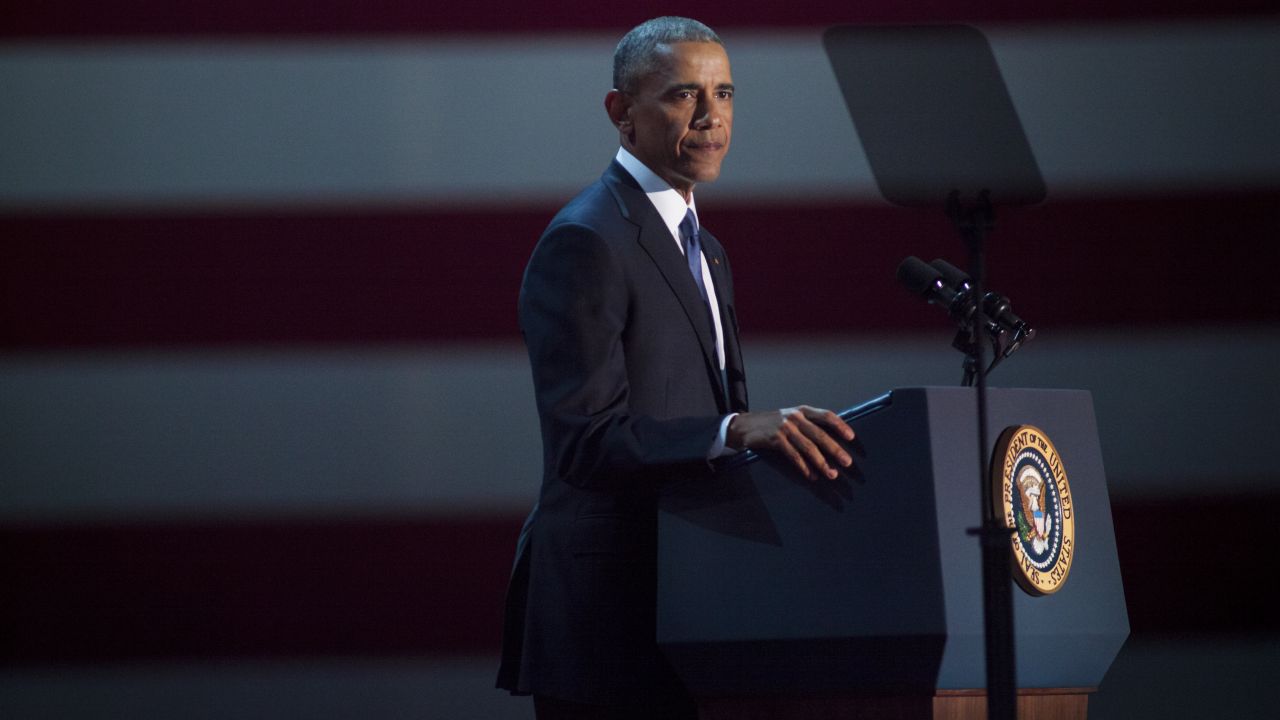
President Barack Obama during his farewell speech at Chicago's McCormick Place on Jan. 10, 2017. (Photo by Darren Hauck/Getty Images)
Barack Obama’s dignified farewell address was nearly overshadowed on Jan. 10 when BuzzFeed published a 35-page intelligence dossier alleging connections between President-elect Donald Trump’s campaign and Vladimir Putin’s government. This presidential transition is so uncharted that there was a moment during Obama’s speech when his hopeful mantra of “Yes we can” trended on Twitter just above an explicit sex act that’s front-and-center in the Trump report.
Obama, eager to bring cheer to a downcast Democratic base, kept his tone hopeful and emphasized the long, twisting arc of social progress. “Our progress has been uneven,” he observed. “The work of democracy has always been hard, contentious and sometimes bloody.” There were moments when Obama delivered this message of optimism and perseverance with such grim poignancy that he seemed to be trying to convince himself.
He wasn’t grim enough. It’s hard not to be moved by a speech like that. But Obama’s farewell encapsulated the tragic flaw of his presidency: A failure to adjust his lofty rhetoric to take on the ferocity of his opposition, a Republican Party that has spent the last eight years delegitimizing him and willfully hollowing out democratic institutions and traditions. Time and again, Barack Obama showed up at a knife fight with an elegant speech about civics.
While Obama took a victory lap and lauded his team’s achievements on rescuing the economy, expanding health care access and capturing Osama bin Laden, his real goal was encouraging young people disheartened by Trump’s election to get involved and fight for change. “If something needs fixing, lace up your shoes and do some organizing,” he said. “If you’re disappointed by your elected officials, grab a clipboard, get some signatures and run for office.”
He spoke with his usual eloquence about the way democracy depends on solidarity, common ground and trying hard to remember that those of different politics and different backgrounds can share an abiding love of country. He targeted fake news, social-media bubbles, a splintered media culture and an unwillingness to test assumptions and believe evidence and facts as deep threats to democracy.
Facebook and fake news, however, are not the threats we must counter.
The real challenge to democracy is that we live in a closely divided country controlled at nearly all levels by Republicans. In our 50/50 nation, Republicans control 69 of 99 legislative chambers, including veto-proof supermajorities in some states where they get fewer total votes.
They have so deeply gerrymandered congressional delegations that the GOP has guaranteed themselves between 60 and 80 percent of the congressional seats in blue and purple states like Pennsylvania, Michigan, Wisconsin, North Carolina, Florida and Ohio.
They have drawn such noncompetitive lines in state houses that in North Carolina this fall, despite intense passion and debate, 57 of 120 house races went uncontested by a major-party candidate. The numbers were just as bleak in Wisconsin, where 49.6 percent of assembly seats went uncontested. (In Georgia the problem is even more stark – upward of 80 percent of lower house seats draw no race at all.)
It is terrific for Obama to champion involvement. But the problem is more severe and systemic than he wants to admit: If the usual channels of collecting signatures and running for office would help, these state legislature races would be hotly contested — after all, North Carolina, Ohio and Wisconsin have been home to intense debates over abortion, transgender bathrooms and collective bargaining. These races go uncontested because the lines make it impossible for the other side to win. We do not have a civics problem. We have a gerrymandering problem.
It is not an accident that Republican red dominates this evenly split country. In 2010 — a census year, after which every state and federal district nationwide is redrawn — savvy GOP strategists targeted just over 100 state legislative seats nationwide and systematically tipped control of the chambers — and redistricting — in their direction. The following year, in state after state, the playbook was the same: Vanish behind closed doors with powerful mapping software to draw lines that would hold for a decade. It worked: In 2012, Republicans held the House despite drawing 1.4 million less votes than Democrats nationwide, and dominated state legislatures as well even while losing the popular vote. These lines are so hopeless and non-competitive that, according to Ballotpedia, the number of uncontested seats nationwide has increased in every election since 2010. Democracy also takes a hit when these states make it harder to vote; all 14 states with new voting restrictions during the 2016 presidential election have legislatures controlled by Republicans.
So why won’t President Obama speak as clearly about the real threat to democracy as President Eisenhower did when he rang alarm bells about the military-industrial complex in his farewell address? Obama mentioned redistricting in such passing that it was easy to miss it: “When Congress is dysfunctional,” he said, “we should draw our districts to encourage politicians to cater to common sense and not rigid extremes.” He called this part of “accepting the responsibility of citizenship.”
But citizens do not draw these extreme districts. Politicians do. Specifically: Republican politicians. Elegant speeches about threats to democracy must make clear the real cause for its decay: A decade-long campaign by one party to undermine the popular vote at the state level and in Congress with the goal of governing from the minority. It has worked. That Democrats can’t find the language to connect our hollowed-out democracy with extreme policy outcomes on climate change, collective bargaining rights, transgender bathrooms, voter ID and more is political incompetence.
Obama yearns for common ground and rational fact-based arguments. Today’s Republicans, meanwhile, focus on strategies that deliver the power to enact an agenda. Why does his style matter, as Obama prepares to leave the scene? Because Obama will be driving the Democrats’ democracy agenda over the next four crucial years. The president has indicated that redistricting reform will be his top political priority. He has teamed with former Attorney General Eric Holder to create the National Democratic Redistricting Committee, which will coordinate the party’s effort to win back state legislatures and a seat at the table in the post-2020 redistricting.
Classy speeches won’t get that done. Democrats have such little hope of flipping legislative chambers in the key states of Wisconsin, Ohio, Michigan, Florida and Pennsylvania that their only hope rests with winning 2018 governorships. If they fail next fall, it will be 2031 before the party gets another crack at the maps. Elegant speeches — and bemoaning fake news and liberal bubbles for our national division — will ensure the Republicans hold state capitals and Congress for another generation.




